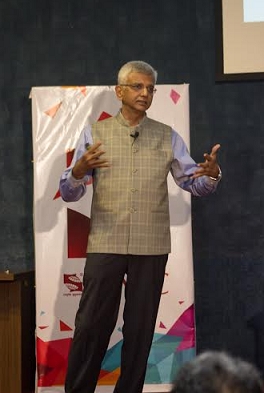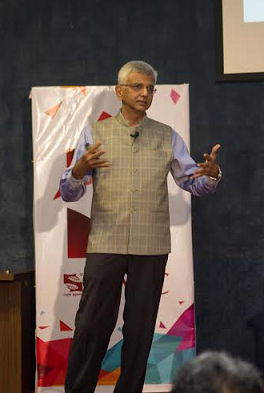
 Through the eyes of Ambi Parameswaran.
Through the eyes of Ambi Parameswaran.
Ambi Parameswaran, former CEO and Executive Director at FCB Ulka Advertising, and currently the President of Advertising Agencies Association of India, brought together the dynamics of Indian consumer behaviour over the last 50 years in his book ‘Nawabs, Nudes & Noodles’. At an enriching session with the students of the Symbiosis Institute of Media & Communication, Pune. He discussed brands, consumers and the spectacular world of advertising, among several other things. Excerpts from the interview:
While everybody in advertising is talking about changing trends, we ask Ambi Parameswaran about something that has remained unvarying over his career spanning 35 years. He espouses that it is human emotions; whether it is the love that a mother has for her child or sibling camaraderie. Their manifestation may have changed, but those basic human traits don’t change.
Brands are redefining age old notions. He draws a riveting character sketch of the evolving Indian man. “Men have started pampering themselves,” he proclaims. “The most threatened species in this country are men. Women are becoming more and more assertive. Men are buying a lot of cosmetics and trying to look pretty. But there’s a lot of pressure because women are becoming more articulate and demanding. So men are trying to compensate by moisturizing.”
Old age was relegated to pills, potions and pilgrimages. Advertising is forcing society to re-think what it means to grow old. Never before have we seen a cohort hitting the age of 65 who are so well informed, so wealthy and in such good health. From the Indian male to re-inventing old age, he jumps to food. “Food is the most difficult thing to convert,” he weighs in. “We’ve only touched the papad and pickles, penetrating only the outside of the thali.”
Advertising is only 0.4% of the GDP. But he expects media costs to go up, especially with the emergence of new sectors such as education, healthcare, telecom and e-commerce. The connecting roads and networks will break through the urban and rural divide. Consumer culture is taking root, with kids unable to name flora, but reciting brand names at the drop of a hat.
When asked about how he forayed into writing, he says it was only owing to the fact that he needed teaching material. All the material was international, what he needed was some Indian material. That’s when he started writing his own cases. It just so happened, that he wrote to Tata McGraw Hill to ask if they’d be interested in publishing it and they said yes. That’s how his first book came out in the year 2000, with 14 cases, which led to the next book and so on and so forth. He wants to keep writing but he doesn’t know what his next book will be about. “Nothing is planned,” he shrugs nonchalantly. Most of his book ideas stem from brainstorming sessions with his publisher. He draws his inspiration from reading and writing the occasional column.
His two months advanced management course at Harvard was interesting because there were 150 students from 60 different countries from a variety of industries. “Being in a classroom with approximately 30 CEOs itself was an experience. There was the CEO of a bank from Poland, someone who runs a coffee company in Italy, someone from the Marines in the US and I was from advertising. It was interesting being in a classroom with so much fire-power, quite literally. It was an experience,” he maintains.
Brands are trying to take on-board some sort of social benefit, but this has to be done on a consistent basis. Industry experts have procured statistics about things which can make your video go viral. One of those things is a social angle and another is the brand being underplayed.
When asked about the possibility of celebrity endorsements dying out, with the onset of relatable advertisements, he counters, “Stars tend to cut across socio-economic barriers, they help brands connect.”
His advice to aspiring media students is to keep their eyes and ears open, read a lot, watch a lot. “If you want to be successful in advertising, don’t just watch advertisements. Watch movies, listen to music, read books, especially fiction, magazines and The New York Times. Don’t be narrow minded at such a young age. I spent 5 years in IIT and didn’t study a lot of engineering. But I read so much. I discovered Alfred Huxley and Somerset Maugham and James Joyce and Alexander Solzhenitsyn. I watched 500 movies of different varieties. So, you learn a lot.”, he quips.
